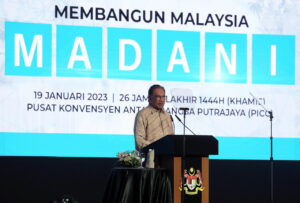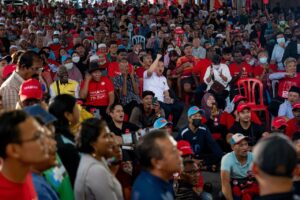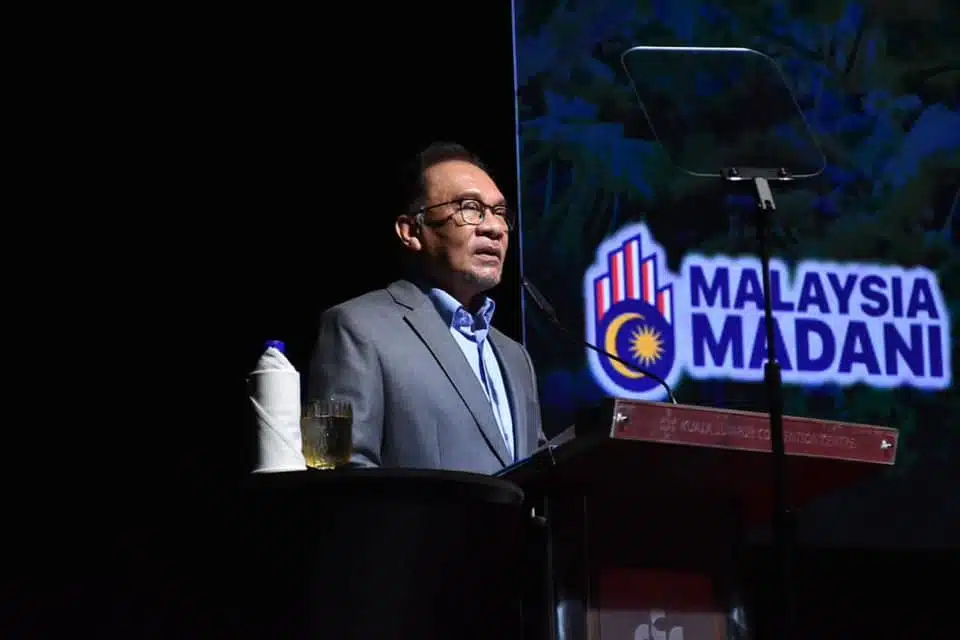By Danial Dzulkifly
SHAH ALAM, Sept 4 — Noticing the critical need to address a purported rising sense of uncertainty, fear and irrationality, Datuk Seri Anwar Ibrahim introduced the Malaysia Madani concept just over two months into his premiership.
The unveiling of the policy framework in February comes as Malaysians search for a glimmer of hope in what was arguably the most tumultuous period in the country’s recent memory.
The nation had just emerged from the aftermath of the Covid-19 pandemic and amidst socio-economic challenges exacerbated by global conflicts, supply chain disruptions, escalating cost of living, increasing underemployment, and a generational skills gap and mismatch.
Adding to the turmoil was one of the most divisive general elections in history in November last year.
The result saw no major coalition securing a sufficient majority to allow them into Putrajaya’s corridors of power, leading to the establishment of the Unity Government coalition under Anwar’s leadership.
The election’s outcome, however, highlighted the preferences of the Malay majority, who voiced a strong desire for a robust new Malay party or coalition to represent their interests, as evidenced by the support garnered by Perikatan Nasional in the polls then.
This sentiment has been further amplified by nativist political campaigning, which at times touched upon racial and religious sensitivities, repeatedly challenging Malaysia’s cherished multi-ethnic and multi-religious harmony.
Under the Malaysia Madani concept, Anwar endeavours to craft a new socio-economic narrative by bringing together the multi-ethnic and economically diverse Malaysian diaspora into a unified society.
This new narrative serves as the cornerstone of the public policies introduced by his administration so far, emphasising dignified living standards and liveable wages, among other progressive policies.
Whilst previous Malaysian prime ministers have introduced their own distinctive narratives, such as 1Malaysia, Keluarga Malaysia and Kerajaan Prihatin, the Madani concept is not merely an amalgamation of these past rallying cries.
It also represents a comprehensive shift aimed at addressing the country’s structural issues and empowering Malaysians from all backgrounds to progress.
The underlying vision of Malaysia Madani envisions a society that is civilised, skilled, and inclusive, founded on six core pillars: sustainability, prosperity, innovation, respect, trust, and compassion.

Why Malaysia Madani matters?
The emphasis on unity has always been at the forefront of every Malaysian administration since independence, yet it has consistently been tailored to the local context.
Malaysia Madani, on the other hand, emphasises the importance for its citizens to build bridges, not only locally, but also among regional and global communities.
Anwar has stressed that Malaysia is no longer exempted from the collective responsibility of achieving sustainable development goals.
The pressing challenge, however, is to assure the predominantly Malay electorate that the Malaysia Madani concept is not just a slogan for the Unity Government comprising Pakatan Harapan (Harapan), Barisan Nasional (BN) and their Sabah and Sarawak allies.
Instead, it is an initiative to consolidate collective decision-making, aiming to present public policies designed to address the country’s significant structural challenges.
The concept is not simply a unifying political catchphrase designed to appease the public, but encapsulates Anwar’s broader vision for the nation’s potential as well.
Anwar’s commitment to multiculturalism, evident during his tenure in Umno and maintained throughout the formation of Parti Keadilan Rakyat (Keadilan), is a testament to this vision, Akademi Nusantara fellow Azmi Hassan pointed out.
“Malaysia Madani reflects Anwar Ibrahim’s political endeavours both before and after the Reformasi movement,” the political analyst said.
“The concept doesn’t solely focus on one group or religion; rather, it encompasses all Malaysians whom he believes would substantially benefit from this idea.
“Consider Keadilan as an example. It was the ‘reformasi’ sentiment that catalysed the birth of a multi-racial party, epitomising Anwar’s vision.”
Can Madani subjugate racial, religious rhetoric?
However, Azmi said the key now is to see how Malaysia Madani evolves and wins over the hearts and minds of the Malay electorate — a critical voters’ segment that all major political parties are vying for support.
“It will be difficult as PN has been promoting nativist and Islamist ideologies, which are the antithesis of the Malaysia Madani concept.
“In this regard, there is a crucial need to propagate the importance of rational thinking, arguments and discussions to ultimately achieve the vision of Malaysia Madani,’’ said Azmi, adding that the prime minister is the appropriate model to emphasise the need for intelligent discourse.

Most recently, Anwar announced the Madani Economy policy framework, devised from analyses of eight different dimensions — economic and financial, legal, institutional, educational, social, cultural, urban, and rural.
The economic narrative contains specific policies that correspond to each of the six pillars under the Malaysia Madani concept.
More precisely, Anwar has shifted from the strong emphasis on solely bolstering the Bumiputera economy, which had been the central focus of previous administrations, to focus on all Malaysians.
This is not to suggest that the current administration is not concentrating on the Bumiputera community’s economy. Instead, it is adopting a holistic approach to uplift all communities, aiming to eradicate hardcore poverty by year-end.
Anwar is acutely aware of the political climate, particularly within the Malay community, and has reaffirmed his commitment to safeguarding the federal constitution, including the special privileges of the Bumiputera.
However, looking ahead, the Malaysia Madani concept is designed to propel the nation forward, amalgamating various communities under a singular, unifying goal that promises benefits for all.





